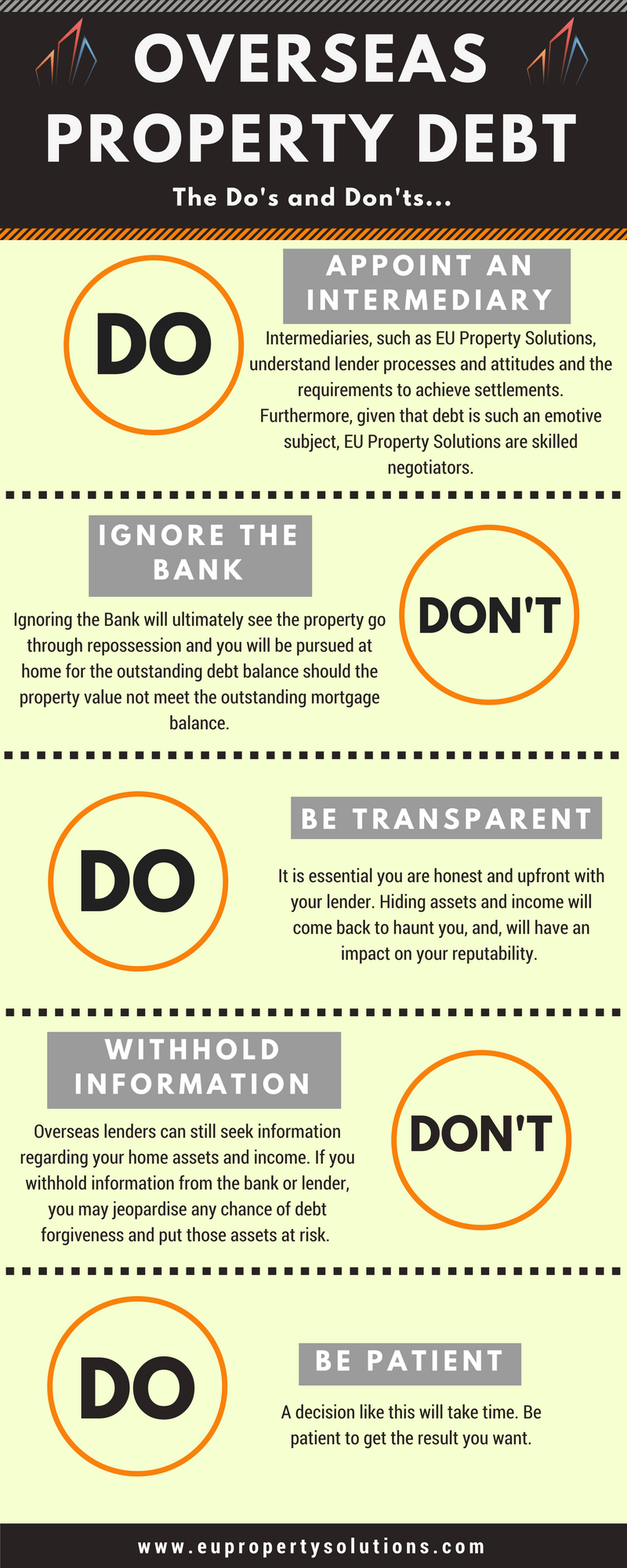The Do’s and Don’ts of dealing with overseas debt
Wednesday, June 6, 2018 @ 1:43 PM

It is important to understand the correct way to deal with overseas creditors.
Unfortunately, there are many stories of borrowers acting in a way that jeopardises potential settlements and their home assets or income.
Below are the Do’s and Don’ts of dealing with overseas debt.
What to do: –
- 1. Liaise amicably with your lender. You will find that many lenders will work with you to find a solution to your debt issues. Many Banks have a commercial decision to make in a lot of overseas debt cases and will look to minimise their losses. If you act amicably and provide the Bank with their requests, in terms of information, you can typically come to an agreeable solution.
- 2. Appoint an intermediary. Intermediaries understand lender processes and attitudes and the requirements to achieve settlements. Furthermore, given that debt is such an emotive subject with borrowers claiming mis-selling and lenders believing borrowers aren’t repaying their debts an intermediary can remove the emotion and seek a clear outcome.
- 3. Be honest and transparent with your lender. Despite being overseas numerous Banks can locate information regarding your financial circumstances through legal and land registry searches. It is essential you are honest and upfront with your lender. Hiding assets and income will come back to haunt you, and, will have an impact on your reputability.
- 4. Be Patient. Any Bank offering debt forgiveness is writing down potentially tens of thousands of euros on their loan book. Of course, a decision like this will take time. Be patient to get the result you want.
What not to do: –
- 1. Putting your head in the sand and ignoring the bank. We cannot stress the importance of refraining from this. Ignoring the bank will cause friction from the outset and jeopardise your home assets and income. Ignoring the Bank will ultimately see the property go through repossession and you will be pursued at home for the outstanding debt balance should the property value not meet the outstanding mortgage balance.
- 2. Assuming the mortgage was mis-sold. Any legal claim regarding this will be lengthy, expensive and fruitless. It would be more cost effective to liaise with the lender to gain an amicable settlement. It is key to understand there that many overseas courts are inundated with property claims.
- 3. Withholding your full financial circumstances. Overseas lenders can still seek information regarding your home assets and income. If you withhold information from the bank or lender, you may jeopardise any chance of debt forgiveness and put those assets at risk.
- 4. Being aggressive and impatient. If you are aggressive in your approach and push the bank too hard for a settlement it simply won’t work. Instead, you will rile the lender who will dig their heels in and be uncooperative regarding proposals.
If you are burdened by overseas property debt, please take the above on board. Our advice could prove fruitful in your quest to achieve a settlement and closure. As stated, it is in your best interests to appoint an experienced intermediary.

You don't have to be registered to leave a comment but it's quicker and easier if you are (and you also can get notified by email when others comment on the post). Please Sign In or Register now.